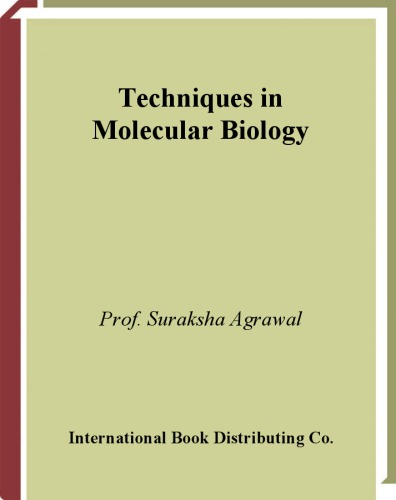

Most ebook files are in PDF format, so you can easily read them using various software such as Foxit Reader or directly on the Google Chrome browser.
Some ebook files are released by publishers in other formats such as .awz, .mobi, .epub, .fb2, etc. You may need to install specific software to read these formats on mobile/PC, such as Calibre.
Please read the tutorial at this link: https://ebookbell.com/faq
We offer FREE conversion to the popular formats you request; however, this may take some time. Therefore, right after payment, please email us, and we will try to provide the service as quickly as possible.
For some exceptional file formats or broken links (if any), please refrain from opening any disputes. Instead, email us first, and we will try to assist within a maximum of 6 hours.
EbookBell Team

4.8
14 reviews
ISBN 10: 9401165631
ISBN 13: 978-9401165631
Author: John Walker, Wim Gaastra
The last few years have seen the rapid development of new methodology in the field of molecular biology. New techniques have been regularly introduced and the sensitivity of older techniques greatly improved upon. Developments in the field of genetic engineering in particular have contributed a wide range of new techniques. The purpose of this book therefore is to introduce the reader to a selection of the more advanced analytical and preparative techniques which the editors consider to be frequently used by research workers in the field of molecular biology. In choosing techniques for this book we have obviously had to be selective, and for the sake of brevity a knowledge of certain basic biochemical techniques and terminology has been assumed. However, since many areas of molecular biology are developing at a formidable rate and constantly generating new terminology, a glossary of terms has been included. The techniques chosen for this book are essentially based on those used in a series of workshops on 'techniques in molecular biology' that have been held at The Hatfield Polytechnic in recent years. In choosing these chapters we have taken into account many useful suggestions and observations made by participants at these workshops. Each chapter aims to describe both the theory and relevant practical details for a given technique, and to identify both the potential and limitations of the technique. Each chapter is written by authors who regularly use the technique in their own laboratories.
1 High Performance Liquid Chromatography of Proteins and Nucleic Acids
2 Analytical Electrophoretic Techniques in Protein Chemistry
3 Protein Blotting
4 The Production and Isolation of Peptides for Sequence Analysis
5 Protein and Peptide Sequence Determination
6 The Extraction and Fractionation of RNA
7 Protein Synthesis in vitro
8 Labelling DNA in vitro — Nick Translation
9 Synthesis of cDNA for Molecular Cloning
10 Plasmid Isolation
11 The Use of Restriction Endonucleases and T4 DNA Ligase
12 Molecular Cloning of cDNA: Bacterial Transformation and Screening of Transformants
13 The Use of Minicells and Maxicells to Detect the Expression of Cloned Genes
14 Gel Electrophoresis of DNA
15 Detection of Specific DNA Sequences — The Southern Blot
16 The Determination of DNA Sequences
17 The Use of Cosmids as Cloning Vehicles
hybridization techniques in molecular biology
hybridization techniques in molecular biology ppt
sequencing techniques in molecular biology
new techniques in molecular biology
techniques in molecular biology and genetic engineering
Tags: John Walker, Wim Gaastra, Molecular Biology